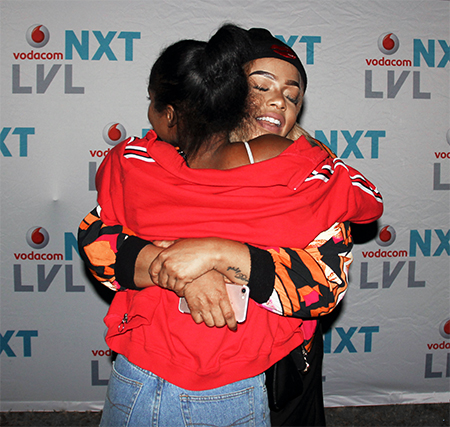
Shekhinah embraces students at the festival.
Photo: Monk Manyeloyi
A weekend that promised great excitement kicked off on Friday 16 February 2018 with the Kovsie ACT Eco-vehicle race. This event saw students teaming up in their respective colleges in high hopes of earning what was assured to be a gratifying reward. The overall winners of the race were North College who also won for team spirit, the slalom race, and the Formula-e lookalike.
Students at the race rumbled with excitement as they witnessed the Rector and Vice-Chancellor of the University of Free State Prof Francis Petersen get his hands dirty when he decided to test-drive one of the Eco-vehicles himself. “It was honestly an electrifying moment that proves that co-curricular activities have the power to indeed help shift education into the right direction,” said Dean of Student Affairs, Pura Mgolombane, who was seen alongside Prof Petersen.
The first official Kovsie ACT music festival was billed to rock Bloemfontein, and it did exactly that! With the gates opening at 4pm on 17 February 2018, the event saw people pouring in shortly afterwards. The community and student-centred celebration saw a turnout nothing short of amazing.
The evening included a laser show display that is always a crowd pleaser, with OFM radio-show host Shandor Potgieter as the official MC for the event. Festivalgoers were entertained by various musical acts that included Sam Ludidi and local DJ duo, C’jo-&-Cider.
The crowd rushed to the main arena as Jack Parow prepared to kick off with his piece, which undoubtedly revved them up. Shekhinah, of course, followed through with a thrilling performance that held fans at her mercy, with many shouting “Shekhinah!”, as she left the stage.
Prince Kaybee’s electrifying set ended off the night on a high note. The audience wanted more but the celebrations for the evening had to come to an end. “The festival was too lit, and the artists brought the heat, exactly what I needed before classes start on Monday,” said #KovsieCyberSta and student Thuli Molebalwa.
Kovsie ACT music festival